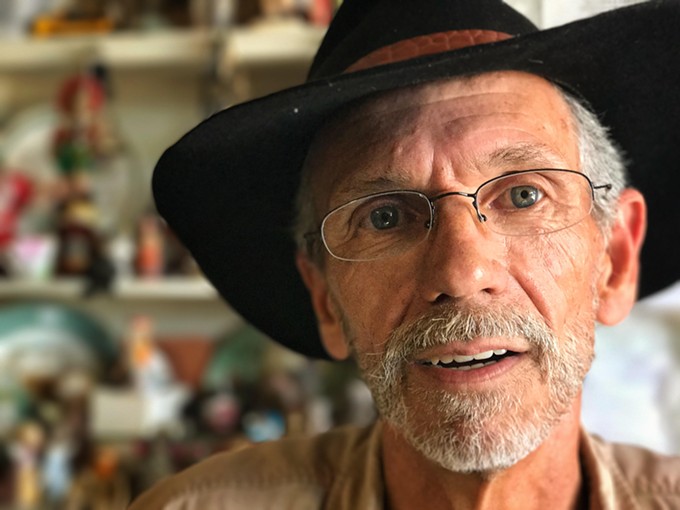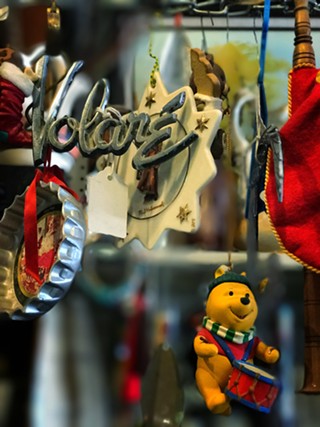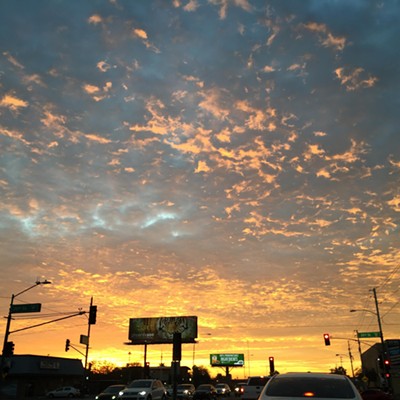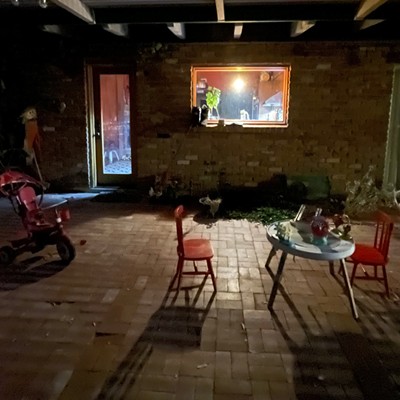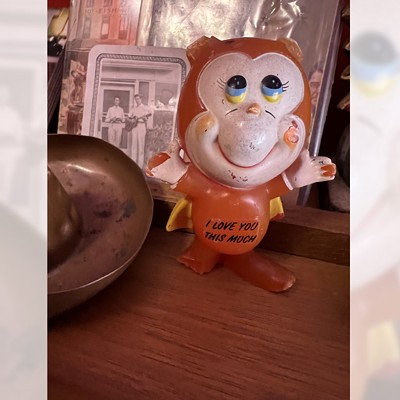The bespectacled guy wearing the beret with the angel pin introduces himself as Boothill Saloon. He unballs a full-length vintage leather coat from his dirty gym bag, slips it on over a black T-shirt and dark shorts and models it for me. Makes him look like a white Youngblood Priest. He's debating wearing the coat out on the street. Says, "I'll get the dirty looks."
Swampbox humidity winnows fleshy body parts, offering scant protection from the heat. It's the hottest goddamn day on record in Tucson, and Boothill’s on foot. I tell Boothill that Youngblood was a badass who'd wear it outside.
Two minutes pass and Boothill has fired off a dozen non-sequiturs. I learn of his goat-killing Pitbull and military-grade crossbows, of booze-injected oranges and the tattoo etched on his right underarm below his elbow, which he proceeds to proudly show you, but not long enough to decode anything save a blotch of blue, crimson, and black. "It's a tower," he says. "I got it before the towers fell."
Then he laughs in that disapproving way that says I’m from some straighter world and therefore incapable of hearing his wisdom and lingo from the street. He launches into another round of sizzling non-sequiturs and I sense his alarming fondness for the Vietnam War, and suddenly understand his many war-inspired tattoos. He's a Nam fanboy. I learn he's 58 years old — but he appears older— and how he regrets being too young to have served in Nam.
His name really Boothill?
That disdainful laugh. "No!"
"Walter Caho!" he adds, stuffing the Superfly leather back into his bag. "Lived in Tucson my whole life." He loses interest in me and turns to the register. Fingers a vintage President Nixon lapel button while purchasing a $6 necklace of fake turquoise. Says, "I'll give it to a gal or something." I imagine the gal.
"Boothill is a killer name," I tell him. I’m sincere in saying this.
"I'll be back tomorrow after I get a tattoo," he says to me and store proprietor James Golden. Then he collects his red-stained Styrofoam Eegees cup and street-ready bag, pushes open the front glass door and steps into sunbaked misery. In that light, in one telling, bizarre instant, I recognize in Boothill how desperation of desires — love, money, hope, security, whatever — had taken its toll. I feel pity for him. Wonder at what point do I myself surrender? At what point do I realize that I’m left to flounder in that invisible part of the world haunted by the unwanted? What point do I choose that place because no one expects anything?
Golden's patient indulgence of Boothill had passed. "Fried, died and laid to the side," he says, and I feel guilty for laughing. But I laugh more. I must laugh because it is suddenly so obvious how everything big and small that sits on either side of the smudged glass door of Desert Dust Thrift Antiques and Collectables, on Alvernon south of 22nd Street, is dying. Such a fact has never been more profound than on this 116-degree Tuesday. That's what Golden is really talking about.
Golden is Desert Dust's proprietor, equal parts swap-meet crank and Tennessee gent. His slight southern honk — rounded off, and expressive, jammed with one-liners ("this town is full of liars not buyers") — soothes. Hails from a long line of raconteurs and moonshiners. The mountain people, he says, "the ridgerunners. They come from the Scottish, the highlanders." He laughs: "I'm still that way. As long as I got two goats and a bottle, I'm OK."
Golden stores rolling tobacco in his shirt pocket and a holstered sidearm. He's thin with deep-set eyes and not too tall but looks like he could brawl with the best of them. He knows martial arts too.
Anyway, his Desert Dust is dying. Too bad. It's mind-boggling, a fantastical dusty surplus disorganized in orderly ways on shelves, floors and ceiling, a million and one pieces from your mom or grandmother, or what your eccentric uncle would use to populate is strange world — the sentimental symbols of indignities and joys, the tattered, the insignificant and the bountiful. It's like walking into the startling insides of someone else's stoner head — the deranged Santas and dusty Star Wars curios, distressed gargoyles, pistol BB guns, toe jewelry and Empire-era rockers, and glitter-heeled boots and 15-cent books and Reagan-era clothes and Lovin' Spoonful 45s, all hand curated, and priced as such. I could live here. I could die here, too.
It's like many in Tucson, big Going Out of Business sign slung across the front of the forlorn cinderblock, soon to be joining the hundreds of other empty storefronts that populate so much of Tucson east of Campbell Avenue. Golden doesn't reckon the Tucson economy is coming back anytime soon, not the real-world economy, anyway. Too hard for him to keep the doors open.
The man who hustled years in local swap-meets, on used car lots, in auction houses, who sold shoes, and who raised three daughters (all have helped him in his shop) with a good business sense and transmissible entrepreneurial spirit, who says he hasn't had a "straight job in 20 years," opened up this place in 2007 with "ten swap-meet tables full of stuff, a few show cases and a credit card with a $15,000 limit." That first year was his best business-wise.
I learn of Golden's dad, a huge inspiration for him and his two younger brothers. "Back in those days they called him a cripple — he had a fused hip bone — before it wasn't PC. After I was born [in the late '50s], my dad was driving a cab trying to make a living. Then he went to school to be a watchmaker in Decatur, Alabama. He could clean and oil 36 watches in a day. Ten and $12 a pop. That's a lot of money in those days."
By the late '70s, Golden was doing the books for his Pop's watch and jewelry business. Townspeople called dad the Golden Boy, the cripple who overcame physical and class odds to open his own jewelry and watch place in a Tennessee blip still run by Klansmen, a good-old-boy network of bankers and politicians. "Corrupt as hell. But my dad knew business. They had nothing on him. And they thought we were Jewish."
He pauses. "You can't cure stupid."
Golden himself got called a "nigger-lover." The shock of that word makes me wary. He wasn't supposed to associate with black people, and this was the ’70s. “The Klan was everywhere still. Hell yes, I had black friends. You'd drive by the grammar school on a specific night and you'd see pointy hats and tommy guns. It was like Mayberry only with an evil slant to the people. But sometimes growing up white in the south wasn't easy either. You just had to be there."
He speaks of his great great grandfather "killed six months before the end of the Civil War." He talks of government plots to conceal John Wilkes Booth's death and escape and how in Tennessee's Franklin County Courthouse, "it lists my great great grandmother married a John Booth. My family claims they went off to Texas."
He'd split Tennessee for the Florida panhandle in the early '80s, taught taekwondo there, did security in bars, but returned home. "I had people from the Klan come down to Florida looking for me," he says. "I picked up a 30 cal. M1 Carbine with a jungle clip and went back to Tennessee. Then the Klan boys tried to kill my parents. They burned their house down." Golden wound up in Tucson indirectly because of the Klan. His youngest brother married into a family with Klan members, and wound up trying to protect a child from them. FBI got involved. Long story short: the entire family packed up and moved to Arizona in a caravan, 37 years ago.
He now lives in a trailer west of Tucson. His brother and his mother each have their own trailer on the same acre lot. He has a wood-burning stove for winter heat, scavenges the wood. Swamp cooler for summer. Says he’d rather be a survivalist on 10,000 acres, away from the numbers where no one expects anything.
"We're all hunters and gatherers," he says. He looks at me like he does anyone else and says I’m hunting and gathering. Fodder to sell to a publication. "Prostitution isn't the oldest profession," he continues. "Pimping is. Buying and selling. It's all commodities." He looks around his dusty shop. Adds, "It's like the stock market, only a smaller scale."
Golden's tired of operating a thrift/antiques store. Another reason to close up shop. "I may go to Denny's and drink coffee all day. I may be on a trail in the mountains and wind up in Argentina. I may just go fishing. It may take me six months, it may take me a year — I'm going to get rid of everything in here."
Is he ever surprised what people will pay for here? "No," he says, "Look who they voted for."
He communicates his politics with gestures of politeness and civility. When he talks of the government and Trump and the media he bundles them together into some vague vessel of tyranny, convinced they're on the long con. I choose not to argue. I understand whatever inner need he has to be away from the numbers.
Ulli Malcolm is an older white-haired woman with a wide smile and German accent who recently moved to Tucson from Las Cruces, New Mexico because her husband, who worked "in missiles," just retired. She purchases a wooden box display filled with a dozen or so aluminum Christmas tree ornaments. Don’t know why but I remind her it’s the hottest day of the summer. Hardly relevant; she's happy with her discovery. Ulli and Golden joke. A public hanging of Washington folk and the unyielding virtues of Rooster Cogburn. It goes on.
The dusty register rings and Golden offers up a total including the everything-must-go, 30-percent-off discount.
"I just can't believe this place is closing." Ulli says before stepping out. You wish it weren't so.
James Golden in his Desert Dust.
[
{
"name": "Air - MedRect Combo - Inline Content 1",
"component": "29441156",
"insertPoint": "1/3",
"requiredCountToDisplay": "9",
"parentWrapperClass": "fdn-ads-inline-content-block"
},{
"name": "Top Stories Video Pair",
"component": "27651162",
"insertPoint": "10",
"requiredCountToDisplay": "1",
"parentWrapperClass": "fdn-ads-inline-content-block"
},{
"name": "Air - MedRect Combo - Inline Content 2",
"component": "29441158",
"insertPoint": "2/3",
"requiredCountToDisplay": "10",
"parentWrapperClass": "fdn-ads-inline-content-block"
},{
"name": "Air - MedRect Combo - Inline Content 3",
"component": "29441159",
"insertPoint": "1000",
"requiredCountToDisplay": "15",
"parentWrapperClass": "fdn-ads-inline-content-block"
}
]

